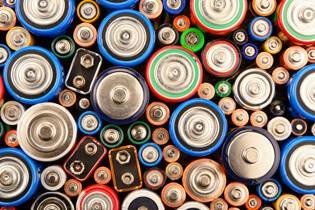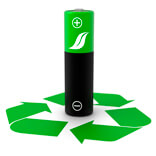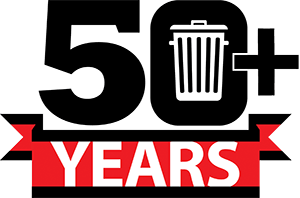Recycling Batteries: Everything You Need to Know About Safe & Proper Battery Disposal
 Batteries provide us with a portable and convenient power source. They come in all shapes and sizes, and they supply us with power for everyday electronics like toys and cellphones, to power tools and laptops. Batteries do more than just power our everyday items, they also keep things running during emergencies. They help control power fluctuations, run commuter trains, and provide back-up power for critical needs like hospitals and military operations. The versatility of batteries is reflected in the different sizes and shapes, but all batteries have two common elements that combine to make power: an electrolyte and a heavy metal.
Batteries provide us with a portable and convenient power source. They come in all shapes and sizes, and they supply us with power for everyday electronics like toys and cellphones, to power tools and laptops. Batteries do more than just power our everyday items, they also keep things running during emergencies. They help control power fluctuations, run commuter trains, and provide back-up power for critical needs like hospitals and military operations. The versatility of batteries is reflected in the different sizes and shapes, but all batteries have two common elements that combine to make power: an electrolyte and a heavy metal.
A battery generates power when heavy metals react with a chemical electrolyte. Wet-cell batteries, which contain a liquid electrolyte, commonly power automobiles, boats, or motorcycles. Mercury was phased out of certain types of batteries in conjunction with the “Mercury-Containing and Rechargeable Battery Management Act,” passed in 1996. Recycling batteries keeps heavy metals out of landfills and the air. Recycling batteries also saves resources because recovered plastic, materials, and metals can be used to make new batteries.
Batteries contain heavy metals such as mercury, lead, cadmium, and nickel. These metals can contaminate the environment, which is why safe & proper battery disposal is important. When incinerated, certain metals might be released into the air or can concentrate in the ash produced by the combustion process. Proper battery disposal means that you're recycling batteries or taking them to a place that accepts and is certified for battery disposal.
Since 1992, South Dakota has taken steps to eliminate hazardous battery disposal from landfills. The Household Hazardous Waste Facility helps is a great resource for recycling batteries because they accept several different types for battery disposal:
- Lead-Acid and Sealed Lead-Acid: car, motorcycle, golf cart, ATV, jet ski, wheelchair, weed trimmer, and security camera
- Button (silver-oxide or mercury-oxide): hearing aides, watches, greeting cards, medical devices, small remote controls, small calculator batteries
- Nickel-Cadmium and Nickel Metal Hydride: camcorders, power tools, two-way radios, cordless phone batteries
- Lithium and Lithium Ion: Laptop, cell phone, digital camera, MP3 player batteries
- Alkaline: batteries from clocks, toys, calculators, handheld gaming devices, flashlights, remote controls. (It is acceptable to place this in your trash. Common alkaline batteries made after 1993 are no longer considered hazardous. However the Household Hazardous Waste Facility also accepts them).
There are other ways to decrease the amount of batteries that you use, which helps make recycling batteries easier and keeps your battery disposal waste to a minimum.
- Buying rechargeable batteries can significantly decrease the amount of waste your normal battery disposal accounts for. For example, two AA-Ni-Cad rechargeable batteries can replace up to 600 single-use batteries. While this isn’t recycling batteries outright, it’s a good way to reduce waste.
- Portable products that rely on solar energy to power them also means you’re recycling batteries less than you normally would. Many electronics stores can help you find alternative energy options for your battery needs.
- Look for the RBRC’s Battery Recycling Seal when buying rechargeable batteries or battery-powered products. The Battery Recycling Seal signifies that the manufacturer is participating in the Charge Up to Recycle!® program and supporting the environment.
Recycling batteries means less hazardous waste in our landfills and using our resources wisely in order to create more products. Improper battery disposal can lead to harmful effects on our landfills, which has a direct effect on our community. Small steps, like purchasing rechargeable batteries, can go a long way in creating less hazardous waste from batteries.
 Recycling batteries is easy and we want to be sure our customers are educated about safe & proper battery disposal because we take pride in our commitment to the environment. Novak Sanitary Service offers residential recycling services to our customers. You can click here to view our list of accepted recyclables. If you have a question about an item that isn’t listed, feel free to email us or give us a call at 605-338-7126. Don’t forget, recycling with Novak means you earn rewards with our Recyclebank program. Earn rewards just by recycling!
Recycling batteries is easy and we want to be sure our customers are educated about safe & proper battery disposal because we take pride in our commitment to the environment. Novak Sanitary Service offers residential recycling services to our customers. You can click here to view our list of accepted recyclables. If you have a question about an item that isn’t listed, feel free to email us or give us a call at 605-338-7126. Don’t forget, recycling with Novak means you earn rewards with our Recyclebank program. Earn rewards just by recycling!Last Modified:




